Sarah Bisbing
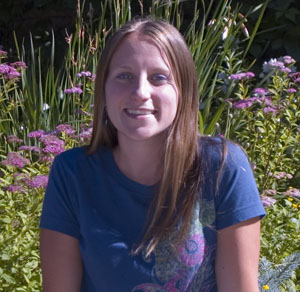
Sarah Bisbing
Though my heart now lies in the mountains of western Montana, I am a tried-and-true city girl from the bustling metropolis of Chicago, Illinois. As a child of the inner-city, my only real exposure to the natural world was mother’s and grandmother’s gardens. Even with my lack of exposure to nature, the experience of gardening with these two fabulous women gave me a keen understanding of plant communities and a constant desire to dig in the dirt (dirt being the four letter word I used until I was properly instructed on the appropriate terminology of SOIL science). Although I spent much of my summers as a child running around my neighborhood (yes, we do have trees and grass) and gardening with my family, I never in a million years would have guessed that I would go on to pursue a career in forest ecology. The only forests exposed to me in my early years were those whizzing by as my family drove through Wisconsin. In the end, however, a high school job in a nursery and greenhouse quickly strengthened my desire to work with plants in some manner.
After high school, I attended the University of Illinois, Urbana-Champaign, on a full scholarship from the Illinois House of Representatives. Though the state covered the tuition, U of I was not the ideal place for pursuing a degree in forest ecology. While on a National Parks “Tour of America,” as my friends and I coined the excursion, I stumbled upon Missoula and the University of Montana. I immediately fell in love and began the process of transferring. I went on to finish my B.S. in Forest Resource Management through the College of Forestry and Conservation and am in the process of attaining my Master’s in Forest Ecology. Though I adore the culture, music, food, and sports (Go Cubs!) of Chi-town, I would never move back. My experiences working with the USGS, NPS, and USFS in the western U.S. transformed me into a mountain girl. Stemming from these experiences and from my lack of exposure during childhood to such wild lands, my true passion is plant community dynamics and the protection of these communities within our public lands system. Preservation and conservation of our nation’s fading resources are the main drivers of my pursuit for degrees in forest management.
I am ecstatic to be a new member of the ECOS family. I have a lot of experience working with children of all ages but never received any formal training in the art and science of teaching. My career goal is to become a professor of forest ecology, with a curriculum geared toward outdoor labs and field-based classes in plant identification and community ecology. Through my participation in the ECOS program, I hope to develop the communication skills and confidence necessary to be an effective teacher. My goal is to learn to create curricula and inquiries that are valuable learning tools for students of all ages.
I have a wide range of hobbies, including backpacking, hiking, canoeing, photography, cross country skiing, and gardening. I do have to admit that I love any arts-and-crafts project and frequently go on plant phenology hikes (yes . . . a geeky hobby, but nonetheless a hobby).
Advisor: Paul Alaback, College of Forestry and Conservation
Mary Bricker
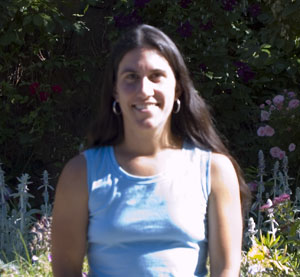
Mary Bricker
The first natural communities I knew were mossy green forests and the fields of western Oregon. I enjoyed exploring and observing them while growing up on my family’s farm in the Willamette Valley, but it wasn’t until high school and college that I was encouraged to start looking at these surroundings in a more scientific way. I was fortunate enough to have high school teachers willing to venture out on field trips with a busload of teenagers, and later to attend a college that encouraged biology students to ask their own questions and design ways to find the answers. When I discovered that one could make a career out of this observing and questioning, I was hooked. I worked various outdoor education and biology research jobs for several years after graduating, and then entered the PhD program in ecology at the University of Montana. I am now starting my fourth year here, and my research focuses on how interactions between plant and animal species can influence plant communities. My career plans are to continue doing research that can keep me out in such beautiful places as Montana’s Blackfoot Valley where I currently work, and to teach in an environment that helps students learn to ask and test their own questions. I was drawn to the ECOS program for the opportunity to practice that sort of teaching and to work with people outside of the university setting to bring science to a more general audience.
Matt Corsi
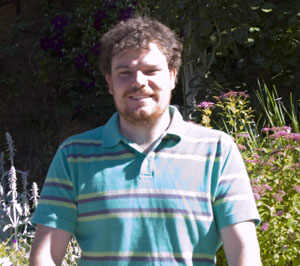
Matt Corsi
My interest in ecology was sealed as a five year-old when I landed my first fish, a Yellowstone cutthroat trout in Willow Creek, Idaho. Since then, favorite recreational pursuits such as fishing, duck hunting, canoeing, and rafting, have always drawn me to aquatic ecosystems. I became intensely curious about the interactions of organisms in aquatic and riparian habitats on cold mornings in duck blinds and quiet evenings waist deep in trout streams.
Since graduating high school, I have studied freshwater fish ecology in habitats as diverse as the Frank Church River of No Return Wilderness and the lower Snake River Reservoir complex. I completed a bachelor’s degree in Fisheries Resources from the University of Idaho in 2003. I came to the University of Montana in 2005 to begin my graduate work studying the management and ecological consequences of hybridization between native westslope cutthroat trout and introduced rainbow trout. I take an applied approach to ecology comes from the desire to answer practical questions necessary for conservation of native species. My position in the Montana Conservation Genetics Laboratory working with my advisor, Paul Spruell, provides me with an excellent venue to explore my applied and theoretical interests.
I strongly believe fostering ecological literacy can do the greatest good for conservation of the ecological diversity that makes the Intermountain West such a wonderful place to live and work. That is why I am so excited to be an ECOS Fellow. I have an excellent opportunity to pass on some of my passion for science and nature as it was passed to me when my father handed me that fishing rod on Willow Creek 20 years ago.
Flo Gardipee
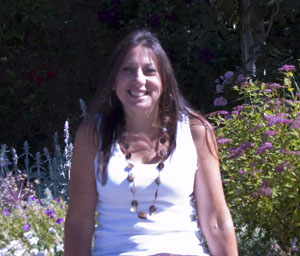
Flo Gardipee
Nathan Gordon

Nathan Gordon
I spent the early years of my life in Bloomington, Indiana. I grew up tending a large vegetable garden and playing for hours in the woods near my house. During that time, I developed a fascination with the natural world, but I never really imagined that I would study ecology. I moved to Missoula in 1994 to be near the mountains and attend the University of Montana. I studied biology as an undergraduate and became very interested in bacteria and the roles they play in the environment. Currently, I am pursuing a Ph.D. in microbial ecology. I study the diversity of bacterial communities and processes on a river floodplain near Glacier National Park. These bacteria are important members of the ecosystem that recycle nutrients and act as a food source to hungry insects that live in and around the river. I really enjoy teaching others about the wonders of nature, and I’m eager to gain the experience that a year with ECOS will provide.
I got married in 2004, and my wife and I share many interests including backpacking, mountain biking, snowboarding, gardening, and walking our dog. We love living in Missoula and hope to remain here for many years.
Mike Machura
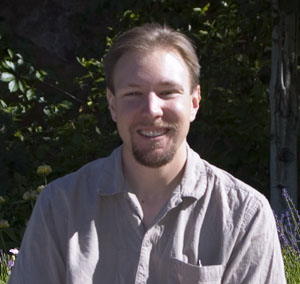
Mike Machura
I am in my second year of a PhD program, and am starting up new research
to examine breeding and movement of boreal toads at different altitudes
and habitats in Glacier National Park. I am originally from Chicago,
but have also lived in upstate New York, Laramie, Wyoming, and the East
African country Tanzania.
While I have been interested in the natural world for as long as I can
remember, it was not until I had the opportunity to live
for two years in Tanzania that I was able to witness first hand the interactions
that occur between humans, plants, animals and the landscape, and truly
develop a passion for ecology. Through my immersion in an African culture,
I developed a unique perspective that not only considered the interactions
of particular organisms, but also the broader picture of
how those interactions play out on a larger landscape in the context
of everyday human activities. In other words, although my research by
necessity tackles precise, manageable questions, I am very interested
in the "big picture." I believe the ECOS
program will help foster an appreciation for our environment
among school-aged children, and will also help build thinking and reasoning
skills through the hands-on activities that are a part of doing science.
In addition to my research, I also have several outside interests including
photography, traveling, and reading. Ultimately, I hope to work internationally
in a position to implement grassroots conservation strategies in developing
nations.
Advisor: Fred
Allendorf/Winsor
Lowe Division of Biological Sciences
Jen Marangelo
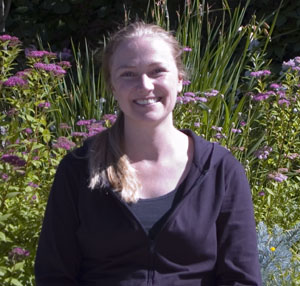
Jen Marangelo
I was born in Illinois and attended high school and college in Alabama. However, my childhood experiences and education did not uncover my interest in ecology (I didn’t have an ECOS program!). It wasn’t until I randomly fell into a position as the ecology director at a Boy Scout camp that my love and fascination with the natural world evolved. I went back to school and got a second bachelor’s degree in wildlife biology at the University of MT and worked as a research biologist for 10 years. With a desire to combine my interest in ecology and education, I am now pursuing a master’s degree in interdisciplinary studies in museum exhibit design and curriculum development. I’m interested in providing informal educational experiences in insect biology and ecology for kids and adults. I’m excited to be on this path and participate in ECOS so I can provide experiences that will allow children to uncover their innate interest in the natural world. In addition to ecology and education, I enjoy hiking (but I travel at a snail’s pace because I stop to look at all the insects), reading, birding, snowshoeing and canoeing.
Advisor: Carol Brewer, Division of Biological Sciences
John MacLean
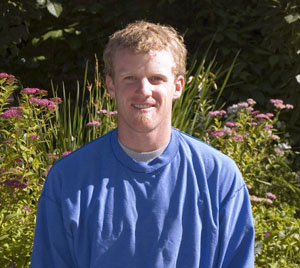
John MacLean
I spent my youth desperately trying to get out of Nashville , TN , and
into the western mountains. I fell in love with the Sierra
Mountains , CA, at a young age, and I returned as often as
I could. When I was completing my BS degree at Furman University
, SC , I realized that a great way to be in the mountains
more was to study earth science. I went on to earn my MS degree in earth
science from Syracuse University, NY, and then I taught earth science
at a high school in Elon, NC. Finally, I made it to the mountains of
western Montana to work on a Ph.D. in earth science. My specific interests
include implementing geochronology techniques to test a Precambrian plate
reconstruction.
So, what does that have to do with ecology? Earth science processes
provide the framework and foundation on which ecosystems are developed.
An understanding of the earth science behind the life science is essential
in a well-rounded ecological study. Hopefully I can contribute some sort
of geological expertise to the ECOS team.
My personal interests include most activities in the mountains. I've
always been an avid hiker, I've picked up mountain and road biking, and
I've begun learning to kayak.
Advisor: James
Sears Department of Geology
Joss McKinnon
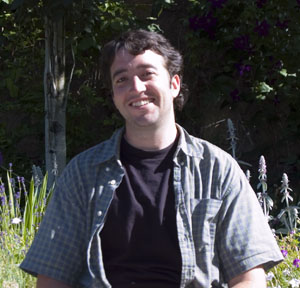
Joss McKinnon
When I was a young child in southern New Mexico, my parents were avid outdoor enthusiasts. We would take hikes often, though we would never get quite as far as they planned. They tell me that I would take a couple of steps, see something new and interesting, and sit down on the trailside to take a closer look. Even at the age of three I was exceedingly interested in understanding the beauty and complexity of the world around me. More recently I have developed the desire to pass along the information that I have gained, and to assist in the training of tomorrow’s ecologists. To this end the ECOS program will require me to present complex concepts in a comprehendible manner. In addition, the opportunity to interact with elementary aged students should prove to be very rewarding. Outside of my studies I enjoy almost anything involving the outdoors, especially snowboarding, rafting, biking, climbing and hiking. Though I return infrequently these days, and doubt that I will live there again, I still consider Santa Fe to be home.
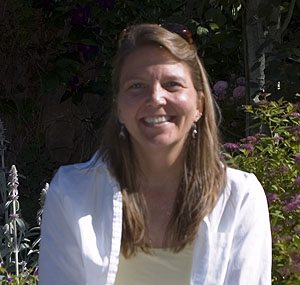
Alison Perkins
Alison Perkins
I didn't realize I was interested in ecology, in fact, I didn't even
really know what it was, until I was in college. I grew up in the city,
doing "city" kinds of things. St. Louis : home of the baseball and football
Cardinals (back then), the Blues (both the music and the hockey team),
the St. Louis Symphony, and the St. Louis Zoo. I spent most of my summers
swimming and waterskiing - I liked being outside - and I chose my college
major, Wildlife Management, for no other reason than it sounded fun.
I was right. I discovered the world outdoors, and I discovered a passion
for ecology that's been growing ever since. I love hiking, birding, and
hunting, plus the sports, music, and museums of the "city." I really
enjoy traveling (local, national, and international), seeing the diversity
this world has to offer. My career interests have evolved from Research
Scientist to Television Producer. I still love wildlife research, especially
ducks; I just would prefer to share the really cool things about ecological
research through television programs. I hope ECOS will help me learn
to communicate with all ages and all learners more effectively, and I
hope to learn to teach for life-long learning.
Advisor: Carol
Brewer College of Forestry and Conservation
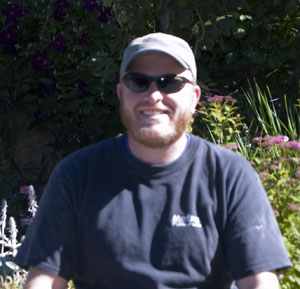
Jeff Piotrowski
Jeff Piotrowski
I was raised in the Salt Marshes of coastal Georgia and from an early
age had a strong interest in the natural world, in particular plants
and fungi. Southeastern salt marshes are among the most productive systems
on earth. At age 13 I would peddle my bike to across the island at midnight
to look for sea turtles or the rare Green fly orchid. It was this environment
gave me an appreciation for the natural world.
I received my undergraduate degree from the University of
Georgia in Botany. UGA was home to the late Eugene Odum,
a pioneer of ecological research, who gave several lectures
to my introductory Ecology class. He always stressed the
importance of teaching more comprehensive ecology to students
at the pre-college levels. I worked in the fungal ecology
lab of Dr. David Porter on the decomposer communities of
the salt marsh. David Porter was a great mentor who encouraged
me to follow my interests no matter how obscure. During my
time in there I spent most weekends in the southern Appalachian
Mountains , an environment with some of the greatest deciduous
tree diversity and the greatest amphibian diversity.
Upon graduation from Georgia I took a position at the University
of Maine with Dr. Joyce Longcore studying a fungal pathogen
of amphibians responsible of several extinctions. I studied
the environmental conditions of the fungus to help amphibian
biologists predict and model outbreaks and I studied the
enzyme production of the fungus to learn how it kills its
host. Maine is a pristine state that is 20% wetlands, which
I explored with all my free time.
After receiving my Master's in Botany/ Plant Pathology from
Maine I worked at the University of Georgia 's Herbarium
where I gained a greater appreciation for plant diversity.
Before taking my current position at the University of Montana
I traveled through Europe working on organic farms with my
fiancé and learning the importance of sustainable
agriculture. I am currently working in the lab of Dr. Matthias
Rillig where I am studying the ecology of arbuscular mycorrhizal
communities for my PhD.
Advisor: Matthias
Rillig Division of Biological Sciences
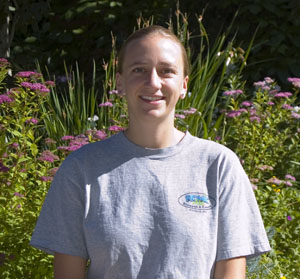
Rebecca Wahl
Rebecca Wahl
I grew up in Seattle, Washington, and had the wonderful fortune of having parents who took me out rambling in the Cascade Mountains and the Pacific Coast starting from before the time I could walk. I was instilled with a love for and respect of the natural world from an early age, which was reinforced by a couple of wonderful teachers in elementary and high school. By the time I went to university at Lewis and Clark College in Portland, Oregon, I knew that I wanted to study biology. My studies brought me a host of new opportunities: a study abroad trip to eastern Australia, scientific research assistant jobs in Washington and the Caribbean, and the opportunity to conduct my own independent research. After graduating, I completed an internship at the Pacific Biodiversity Institute in the North Cascades, worked for the Nature Conservancy, and completed an AmeriCorps service project (developing a volunteer wildlife monitoring program on Portland’s greenspaces) before beginning graduate school in the Wildlife Biology program here at the University of Montana.
My research focuses on amphibian population dynamics, with projects on both the boreal toad (Bufo boreas) and the Columbia spotted frog (Rana luteiventris). I am examining annual fluctuations in populations of these species to understand how they relate to our understanding of longer-term growth and decline in amphibian populations.
Some of my other interests include biking, running, camping, hiking, traveling, baking/cooking, reading, and playing the piano.
Upon graduation from Georgia I took a position at the University
of Maine with Dr. Joyce Longcore studying a fungal pathogen
of amphibians responsible of several extinctions. I studied
the environmental conditions of the fungus to help amphibian
biologists predict and model outbreaks and I studied the
enzyme production of the fungus to learn how it kills its
host. Maine is a pristine state that is 20% wetlands, which
I explored with all my free time.
After receiving my Master's in Botany/ Plant Pathology from
Maine I worked at the University of Georgia 's Herbarium
where I gained a greater appreciation for plant diversity.
Before taking my current position at the University of Montana
I traveled through Europe working on organic farms with my
fiancé and learning the importance of sustainable
agriculture. I am currently working in the lab of Dr. Matthias
Rillig where I am studying the ecology of arbuscular mycorrhizal
communities for my PhD.
|
|

 Funded by the National Science Foundation
Funded by the National Science Foundation